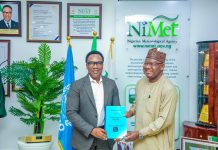The Minister of Tourism, Mrs. Lola Ade-John, has ramped up efforts to boost Nigeria’s domestic tourism by advocating for improved infrastructure and visa reforms. In a series of high-level engagements with key ministries, she is addressing challenges hindering the sector’s growth and pushing for collaborative solutions to unlock its full potential.
During a recent meeting with the Minister of Transport, Alhaji Said Alkali, both leaders discussed strategies to incorporate Nigeria’s rail and road networks into a broader tourism framework. Mrs. Ade-John emphasized the vital role that Nigeria’s tour operators could play in leveraging these transportation assets to expand their businesses and attract more domestic tourists. The discussions concluded with a decision to establish a Joint Committee that will bring together tour operators and key stakeholders from both ministries. This committee will work on creating actionable plans to implement domestic tourism projects aimed at driving sectoral growth.
In a related effort to remove barriers to tourism, Mrs. Ade-John has been working closely with the Minister of Interior, Mr. Olubunmi Tunji-Ojo, and the Comptroller General of the Nigeria Immigration Service (NIS), Mrs. Kemi Nanna Nandap, to resolve visa-related issues. One of the major obstacles identified was the high cost of visa processing, which has discouraged many potential tourists, particularly from other African countries. To tackle this, the Tourism Minister is advocating for streamlined visa-on-arrival processes and a significant reduction in fees.
In a recent development, the Nigerian government announced a substantial reduction in online visa fees. For example, Kenyan travelers who previously paid $225 for a visa will now be charged only $95 or less. In some cases, travelers applying through Nigerian embassies could receive visas for as low as $50. This review was part of a broader Presidential directive aimed at addressing the concerns of frequent travelers and tourism practitioners regarding the high cost of visas. The adjustment is expected to ease visa challenges for African nationals, making Nigeria a more accessible destination.
These reforms have been well-received by event organizers and tourism stakeholders. For instance, the organizers of the Akwaaba African Travel Market recently commended the Tourism Minister and immigration authorities for alleviating visa difficulties faced by international delegates attending the event.
Since assuming office, Mrs. Ade-John has been actively attending tourism-related events across Nigeria, more than her predecessors did in four years. These engagements have provided her with firsthand insights into industry challenges, shaping her strategy to revitalize the tourism sector.
In her closing remarks, the Minister reaffirmed her commitment to ongoing collaboration with other ministries and agencies. She emphasized that the obstacles faced by tourism operators and stakeholders will continue to be addressed as part of a comprehensive plan to grow Nigeria’s tourism potential and position the country as a leading destination in Africa.
















